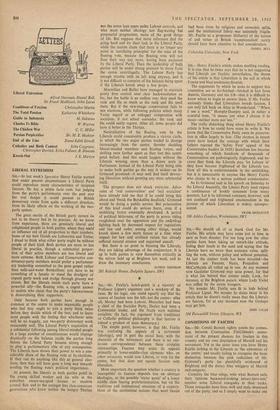Liberal Extremism Alfred Sherman, Daniel Bell, Sir Frank Medlicott, John
Lucas
Conditions of Fascism Christopher Martin The Total Passion Katharine Whitehorn Guide to Indonesia M. Sukarno Charles I's Bible W. Warren The Chicken War C. C. Miller Persian Perplexities Dr. M. E. Mahyar End of the Line Dame Edith Sitwell Catholics and Birth Control John Coggrave,
Christopher Derrick, Erika Fallaux, B. Duncan
Knock-Out J. E. Marty'?
LIBERAL EXTREMISM
SIR,—In last week's Spectator Henry Fairlie warned that under present circumstances a Liberal Party could reproduce many characteristics of incipient fascism. He has a prima facie case, but judging from the party's performance over the past year the real danger it could present to British democracy stems from quite a different direction, from its likely effects on the working of the two- party system.
The great merits of the British party system lie not in its theory but in its practice. As we know from experience, there are genuinely liberal and enlightened people in both parties, where they wield an influence out of all proportion to their numbers. Some of my best friends are Labourites and Tories; I dread to think what either party might be without people of their kind. Both parties are more or less liberal in practice, though a substantial propor- tion of their active members are less liberal and more extreme. Both Labour and Conservative con- stituency-party members would prefer a parliament- ary leadership committed to the pure gospel rather than milk-and-water Butskellism; you have to be something of a fanatic to stand the drudgery of unpaid party work and trudge through gloomy wet streets. But the liberals inside each party have a powerful ally—the floating vote, a cogent answer to zealots who claim that the party's lukewarmness is demoralising their supporters.
Only because both parties have enough in common at the centre to make reasonable people who feel they ought to join a party think twice before they decide which of the two, and to leave most people with the feeling that whichever wins will be no tragedy, can two-party democracy work reasonably well. The Liberal Party's acquisition of a substantial following among liberal-minded people in a large number of constituencies would impinge drastically on the balance inside the parties long before the Liberal Party became strong enough to play a parliamentary role of any consequence. The Liberals have shown their power to win a con- siderable share of the floating vote at by-elections. If they can do anything like this at general elec- tions, then they will have gone a long way towards eroding the floating vote's political importance.
At present, the liberals in both parties point to the young skilled worker and his wife in the suburban owner-occupied houses or modern council flats and to the younger less class-conscious generations who knew neither the hungry Thirties
nor the seven lean years under Labour controls, and who want neither ideology nor flag-waving but purposeful pragmatism, more of the good things of life. But suppose that more reformers find the going hard and try their luck in the Liberal Party, while the zealots claim that there is no longer any point in 'sacrificing principles' for the sake of the floating vote, because the floating vote will not float their way any more, having been anchored by the Liberal Party. Then the leadership of both parties will be under strong pressure to move from the centre centrifugally. The Labour Party has enough trouble with its left wing anyway, and it is not difficult to conceive of the balance being upset if the Liberals knock away a few props.
Macmillan and Butler have managed to maintain pretty firm control over their backwoodsmen so far, but the battle is an endless one; they need the rank and file as much as the rank and file need them. But if the new-image conservatism fails to win elections, while following policies which many Tories regard as an unhappy compromise with socialism, if not actual surrender, the rank and file could easily regress. After all, some people did have it better in the Thirties.
Neutralisation of the floating vote by the Liberals could conceivably produce .a vicious circle, in which the two major parties tended to diverge increasingly from the centre, thereby shedding liberal-minded members and floating voters, and drifting even farther apart as they lost this centri- petal ballast. And this could happen without the Liberals winning more than a dozen seats in Parliament. Instead of the Liberal Party being able to make both parties go the way it wishes—as Jo Grimond promised—it may well find itself devour- ing liberalism without growing any more substantial itself, The prospect does not shock everyone. Advo- cates of 'real conservatism' and 'real socialism' have already told me that if he could bring this about and 'break the Butskellite deadlock,' Grimond would be doing a public service. But polarisation of this kind could do serious harm, even if a stabilising factor eventually developed. A period of political bitterness, of the party in power riding roughshod over the opposition and the underdogs fighting back by decreased respect for regulations and law and order, among other things, would knock down a few more fences at a time when respect for law and civilised values has already suffered natural erosion and organised assault.
But there is no point in blaming the Liberals; they are taking advantage of the conjuncture. It is up to both parties to view themselves critically in the mirror held up at Brighton last week, and to draw the necessary conclusions.






































 Previous page
Previous page